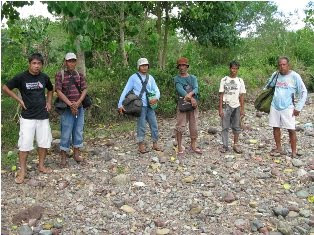The struggle to save Palawan (known as the Philippines’ Last Frontier) is not only about saving trees and rare species. It is also about nourishing the Filipino cultural heritage, so powerfully represented by those indigenous communities that - after escaping Spanish and American colonization (while resisting the new ‘mining imperialism’ now) - continue to represent the 'living roots' from which all Filipinos originate. Therefore, environmental plundering by mining companies is not only a crime against nature but it is also a crime against culture, a sort of genocide that annihilates the most profound roots of the Filipino's history and ultimately plunders the cultural heritage of the whole nation! In this movie, Kawali, the mythical ancestor depicted by Batak narrators emphasises humility and trust towards the supernal beings in charge of animals and plants. On the contrary, the attitude of Kawali’s brother-in-law comes to represent the epitome of inappropriate behaviour, such as the lack of respect towards the mystical keepers of animals and - here specifically - towards the “father of bees”: a relationship that contemporary Batak continues to restore though the lambay ceremony. The sudden switch between the narration of the Batak myth and the threats posed by mining companies serves to introduce the work of ALDAW, a local network of indigenous peoples struggling for the protection of their ancestral land against large-scale corporations.
Showing posts with label photoGPS. Show all posts
Showing posts with label photoGPS. Show all posts
Wednesday, August 01, 2012
Palawan - our struggle for nature and culture
The struggle to save Palawan (known as the Philippines’ Last Frontier) is not only about saving trees and rare species. It is also about nourishing the Filipino cultural heritage, so powerfully represented by those indigenous communities that - after escaping Spanish and American colonization (while resisting the new ‘mining imperialism’ now) - continue to represent the 'living roots' from which all Filipinos originate. Therefore, environmental plundering by mining companies is not only a crime against nature but it is also a crime against culture, a sort of genocide that annihilates the most profound roots of the Filipino's history and ultimately plunders the cultural heritage of the whole nation! In this movie, Kawali, the mythical ancestor depicted by Batak narrators emphasises humility and trust towards the supernal beings in charge of animals and plants. On the contrary, the attitude of Kawali’s brother-in-law comes to represent the epitome of inappropriate behaviour, such as the lack of respect towards the mystical keepers of animals and - here specifically - towards the “father of bees”: a relationship that contemporary Batak continues to restore though the lambay ceremony. The sudden switch between the narration of the Batak myth and the threats posed by mining companies serves to introduce the work of ALDAW, a local network of indigenous peoples struggling for the protection of their ancestral land against large-scale corporations.
Tuesday, July 27, 2010
Palawan ‘UNESCO Man and Biosphere Reserve’ in the grip of Mining Companies?
Puerto Princesa - ALDAW. On the 7th of June (see IC release) 600 protesters from farmers and indigenous communities reached the capital city of Puerto Princesa on Palawan Island requesting the Provincial Government not to endorse the proposed mining plans of MacroAsia and Ipilan Nickel Corporation (INC). As a result of the negotiations taking place between the protesters’ delegation and policy makers in Puerto Princesa, the Provincial Government agreed that endorsement of both MacroAsia and INC should have required further investigation. However, that promise was not honoured and, after a few days, the Provincial Government gave his endorsement to MAC and INC to operate in one of the best conserved biocultural paradises found in the Philippines, and in South-East Asia as a whole.
The area given out to mining concession is also inhabited by traditional indigenous Palawan having limited contacts with the outside world. Moreover, the Gantong range and neighboring areas where MAC and INC intend to operate are within the area recently declared as Mount Mantalingahan Protected Landscape, pursuant to Presidential Proclamation no. 1815.
Both the MPSA areas of MacroAsia and INC are located in ecologically valuable areas which include watersheds, hunting/ agricultural grounds, extractive reserves of Non-Timber Forest Products (NTFPs) such as Almaciga (Agathis philippinensis) resin, on which upland indigenous communities depend for their daily subsistence. Also indigenous peoples’ sacred and worship sites are found within the mining tenements of these companies.
Representatives of ELAC (Environmental Legal Assistance Center) are now filing cases against government officials and their respective agencies for having endorsed MAC and INC without securing first the needed social acceptability requirements and in disregard of the Strategic Environmental Plan (Republic Act 7611).
Say ELAC Atty. Edward G. Lorenzo: “the sustainable management of the entire Province is, in fact, governed by the SEP law which prohibits any human activity in those areas that are classified as ‘core zones’ and that – very unfortunately - are now part of MAC and INC mining tenements”. A indigenous member of the indigenous community of Gieb (Barangay Maasin, Brooke’s Point Municipality) also claims: “they (mining personnel of MAC) just entered our land without asking permission, and they removed our rice plants to excavate big ditches in our agricultural fields and also up into the mountains, only few meters away from the Balgtik (Agathis Philippinensis) trees that we sell and from which we depend for our survival”. According to another member of the same community: “MacroAsia peoples have removed soil and trees also in those sacred forest that we call lylien and that are inhabited by powerful super-human beings (Taw Kawasa)”.
Between 12-16 July a geotagging field reconnaissance carried out by the ALDAW (Ancestral/Land Domain Watch) in collaboration with the Centre for Biocultural Diversity (CBCD) of the University of Kent has confirmed that MacroAsia test pits and drilling holes are found in ‘core zones’ (areas of maximum protection) around and even above 1,000 m ASL. Indigenous peoples trained on basic GPS and Geotagging technologies, with their own set of equipment divided into two groups to cover a large portion of the MAC and INC mining tenement area.
It appears that both MAC and INC have violated the basic tenets of the Strategic Environmental Plan (SEC) and also of the Indigenous Peoples Rights Act (IPRA Law), a national law protecting the interests of Indigenous Cultural Communities (ICC). Faced by this and similar accusations, the Provincial Government recently made a statement according to which MacroAsia and INC may not be allowed to operate in core zones, but their activities might be limited only to multiple/manipulative use areas. Again, ocular inspection and GPS data obtained by ALDAW and CBCD indicate the those portions of MacroAsia and INC mining concessions, which are outside the core zones, still include forested buffer zones which, obviously, do not fit by any means into the standard definition of ‘multiple/manipulative use zones’, where – according to the law – mining might be allowed. In fact, the mining claims of both MAC and INC are entirely located in ‘core zones’, ‘restricted zones’, agricultural and agroforestry areas that are subject to various cropping regimes. All these categories, according to the SEP law, should not be subject to any other form of large-scale extractive activity.
Also, lowland farmers are extremely concerned about the siltation of their wet-rice cultivation, as all irrigation water coming into their fields originates from the mountains where mining is supposed to take place. Members of academic institutions have suggested that: unless these precious water catchments are protected from mining operations, at least 50% of Brooke’s point sustainable agriculture, which requires irrigation, might be lost.
Says a spokesman of Alyansa Tigil Mina (the largest anti-mining advocacy group in the country) “Ironically enough the mining companies and the politicians who are endorsing them have also infringed the Philippine Mining Act which prohibits mining in old growth or virgin forest, proclaimed watershed forest reserves, wilderness area, and other areas of outstanding environmental value”. According to Atty. Mary Jean Feliciano of the ALDAW Network “in endorsing the mining exploration of both MAC and INC, the Sangguniang Bayan (Local Government of Brooke’s Point) has acted in contradiction with its own Municipal Comprehensive Land Use Plan (CLUP) for 2000-2010, in which mining was never considered as a development strategy and, in doing so, it has also bypassed the interests of local communities, as well as all forms of public consultations”.
Undoubtedly, the endorsement by both Local and Provincial governments of the proposed operations of MAC and INC contravenes also those provisions contained in well know conventions [e.g. The Convention on Biological Diversity (CBD) and the UN Declaration on the Rights of Indigenous Peoples that the Philippine Government has already signed. Says a member of the Palawan advocacy community: “When the Government itself infringes its own laws so bluntly, it means that the fundamentals of democracy are breaking apart and a new form of state-led terrorism is coming into being to deprive hundreds of farmers and indigenous peoples of their traditional, and thus legitimate sources of life, just to benefit a handful of greedy and irresponsible businessmen and their cronies”.
On July 30, 2010 the members of the Palawan Council for Sustainable Development (PCSD) - a local government body in charge of the protection and sustainable management of the province - will meet to decide whether to issue a SEP clearance to the operations of MacroAsia and Ipilan Nickel Corporations. The future of one of the most pristine forests in the Philippines and the life of thousands of peoples who depend from it, is now in the hands of the Council.
Indigenous peoples and their networks, farmers, fisher folks, the Palawan NGO Network Inc (PNNI) and its associates, are uniting their effort to convince the PCSD to take a responsible decision which will ensure the sustainable future of Brook’s Point Municipality and of its biocultural diversity.
What you can do ...
Sign a Petition to Stop Mining in Palawan!
And address your concerns to:
Palawan Council for Sustainable Development
oed@pcsd.ph . and c/o Mearl Hilario mearlhilario@yahoo.com
FAX: 0063 (048) 434-4234
Honorable Governor of Palawan
Baham Mitra
abmitra2001@yahoo.com
FAX: 0063 (048) 433-2948
For more information watch ALDAW videos
http://www.vimeo.com/aldawnetwork
http://www.youtube.com/user/ALDAWpalawan
http://hub.witness.org/en/users/aldaw-network
or contact the ALDAW Network (Ancestral Land/Domain Watch) aldawnetwork@gmail.com and Alyansa Tigil Mina (nc@alyansatigilmina.net / alyansatigilmina@gmail.com )
The area given out to mining concession is also inhabited by traditional indigenous Palawan having limited contacts with the outside world. Moreover, the Gantong range and neighboring areas where MAC and INC intend to operate are within the area recently declared as Mount Mantalingahan Protected Landscape, pursuant to Presidential Proclamation no. 1815.
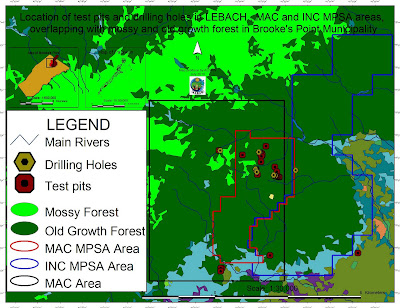 |
| Location of test pits and drilling holes within the mining concessions and their overlap with mossy and old growth forest in Brook's Point Municipality |
Representatives of ELAC (Environmental Legal Assistance Center) are now filing cases against government officials and their respective agencies for having endorsed MAC and INC without securing first the needed social acceptability requirements and in disregard of the Strategic Environmental Plan (Republic Act 7611).
Say ELAC Atty. Edward G. Lorenzo: “the sustainable management of the entire Province is, in fact, governed by the SEP law which prohibits any human activity in those areas that are classified as ‘core zones’ and that – very unfortunately - are now part of MAC and INC mining tenements”. A indigenous member of the indigenous community of Gieb (Barangay Maasin, Brooke’s Point Municipality) also claims: “they (mining personnel of MAC) just entered our land without asking permission, and they removed our rice plants to excavate big ditches in our agricultural fields and also up into the mountains, only few meters away from the Balgtik (Agathis Philippinensis) trees that we sell and from which we depend for our survival”. According to another member of the same community: “MacroAsia peoples have removed soil and trees also in those sacred forest that we call lylien and that are inhabited by powerful super-human beings (Taw Kawasa)”.
Between 12-16 July a geotagging field reconnaissance carried out by the ALDAW (Ancestral/Land Domain Watch) in collaboration with the Centre for Biocultural Diversity (CBCD) of the University of Kent has confirmed that MacroAsia test pits and drilling holes are found in ‘core zones’ (areas of maximum protection) around and even above 1,000 m ASL. Indigenous peoples trained on basic GPS and Geotagging technologies, with their own set of equipment divided into two groups to cover a large portion of the MAC and INC mining tenement area.
It appears that both MAC and INC have violated the basic tenets of the Strategic Environmental Plan (SEC) and also of the Indigenous Peoples Rights Act (IPRA Law), a national law protecting the interests of Indigenous Cultural Communities (ICC). Faced by this and similar accusations, the Provincial Government recently made a statement according to which MacroAsia and INC may not be allowed to operate in core zones, but their activities might be limited only to multiple/manipulative use areas. Again, ocular inspection and GPS data obtained by ALDAW and CBCD indicate the those portions of MacroAsia and INC mining concessions, which are outside the core zones, still include forested buffer zones which, obviously, do not fit by any means into the standard definition of ‘multiple/manipulative use zones’, where – according to the law – mining might be allowed. In fact, the mining claims of both MAC and INC are entirely located in ‘core zones’, ‘restricted zones’, agricultural and agroforestry areas that are subject to various cropping regimes. All these categories, according to the SEP law, should not be subject to any other form of large-scale extractive activity.
Also, lowland farmers are extremely concerned about the siltation of their wet-rice cultivation, as all irrigation water coming into their fields originates from the mountains where mining is supposed to take place. Members of academic institutions have suggested that: unless these precious water catchments are protected from mining operations, at least 50% of Brooke’s point sustainable agriculture, which requires irrigation, might be lost.
Says a spokesman of Alyansa Tigil Mina (the largest anti-mining advocacy group in the country) “Ironically enough the mining companies and the politicians who are endorsing them have also infringed the Philippine Mining Act which prohibits mining in old growth or virgin forest, proclaimed watershed forest reserves, wilderness area, and other areas of outstanding environmental value”. According to Atty. Mary Jean Feliciano of the ALDAW Network “in endorsing the mining exploration of both MAC and INC, the Sangguniang Bayan (Local Government of Brooke’s Point) has acted in contradiction with its own Municipal Comprehensive Land Use Plan (CLUP) for 2000-2010, in which mining was never considered as a development strategy and, in doing so, it has also bypassed the interests of local communities, as well as all forms of public consultations”.
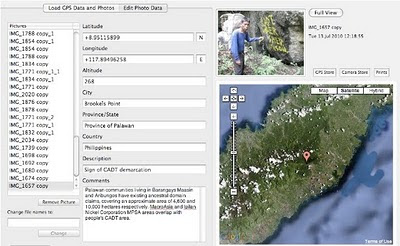 |
| Cornerstone of a CADT (Certificate of Ancestral Domain Title) |
Undoubtedly, the endorsement by both Local and Provincial governments of the proposed operations of MAC and INC contravenes also those provisions contained in well know conventions [e.g. The Convention on Biological Diversity (CBD) and the UN Declaration on the Rights of Indigenous Peoples that the Philippine Government has already signed. Says a member of the Palawan advocacy community: “When the Government itself infringes its own laws so bluntly, it means that the fundamentals of democracy are breaking apart and a new form of state-led terrorism is coming into being to deprive hundreds of farmers and indigenous peoples of their traditional, and thus legitimate sources of life, just to benefit a handful of greedy and irresponsible businessmen and their cronies”.
On July 30, 2010 the members of the Palawan Council for Sustainable Development (PCSD) - a local government body in charge of the protection and sustainable management of the province - will meet to decide whether to issue a SEP clearance to the operations of MacroAsia and Ipilan Nickel Corporations. The future of one of the most pristine forests in the Philippines and the life of thousands of peoples who depend from it, is now in the hands of the Council.
Indigenous peoples and their networks, farmers, fisher folks, the Palawan NGO Network Inc (PNNI) and its associates, are uniting their effort to convince the PCSD to take a responsible decision which will ensure the sustainable future of Brook’s Point Municipality and of its biocultural diversity.
What you can do ...
Sign a Petition to Stop Mining in Palawan!
And address your concerns to:
Palawan Council for Sustainable Development
oed@pcsd.ph . and c/o Mearl Hilario mearlhilario@yahoo.com
FAX: 0063 (048) 434-4234
Honorable Governor of Palawan
Baham Mitra
abmitra2001@yahoo.com
FAX: 0063 (048) 433-2948
For more information watch ALDAW videos
http://www.vimeo.com/aldawnetwork
http://www.youtube.com/user/ALDAWpalawan
http://hub.witness.org/en/users/aldaw-network
or contact the ALDAW Network (Ancestral Land/Domain Watch) aldawnetwork@gmail.com and Alyansa Tigil Mina (nc@alyansatigilmina.net / alyansatigilmina@gmail.com )
Labels:
activism,
geo-referencing,
geo-tagging,
geocoding,
Geographic Information Systems,
mining,
Palawan,
Participatory GIS,
participatory mapping,
Philippines,
photoGPS,
ppgis,
web2fordev
Saturday, January 30, 2010
Indigenous People’s Exchanges Amongst Philippines and Peru Promoted by CBCD and ALDAW
Through A Christensen Fund grant “Linking Networks on Pastoralism and Mobile production systems”, Dario Novellino (research at the Centre for Biocultural Diversity (CBCD) of the University of Kent and CEESP member) has facilitated the establishment of solidarity links between the indigenous communities of Palawan and those of Madre de Dios (Peru) who have resisted and are resisting mining for more than two decades.
 The establishment of this linkage took place right at the time when indigenous peoples of the Amazonian Peru had began various forms of open resistance against hydrocarbon extraction in their traditional territories. The solidarity link between the IPs of Peru and Palawan is being consolidated through the collaboration of the Ancestral Land/Domain Watch (ALDAW), the Peoples and Plants International (PPI) and, specifically, through the personal efforts of Dr. Miguel Alexiades (CBCD staff and PPI co-director). Such exchange promotes the sharing of experiences as a way of 1) fostering reflection and joint actions through the establishment of strategic alliances; and 2) addressing common problems regarding indigenous links, rights and claims over ancestral homelands and cultural landscapes.
The establishment of this linkage took place right at the time when indigenous peoples of the Amazonian Peru had began various forms of open resistance against hydrocarbon extraction in their traditional territories. The solidarity link between the IPs of Peru and Palawan is being consolidated through the collaboration of the Ancestral Land/Domain Watch (ALDAW), the Peoples and Plants International (PPI) and, specifically, through the personal efforts of Dr. Miguel Alexiades (CBCD staff and PPI co-director). Such exchange promotes the sharing of experiences as a way of 1) fostering reflection and joint actions through the establishment of strategic alliances; and 2) addressing common problems regarding indigenous links, rights and claims over ancestral homelands and cultural landscapes.
 The envisaged goal is to enable the production of jointly produced video materials that could be used to exert pressure at a national and international policy level.
The envisaged goal is to enable the production of jointly produced video materials that could be used to exert pressure at a national and international policy level.
Julio Cusurichi, representing the indigenous organization COINBAMAD (Consejo Indigena de la Cuenca Baja de Madre De Dios) and winner of the well-known award, the Goldman Prize - arrived in the Philippines on July 2009, leaving the country after 21 days. He traveled to Palawan (Philippines) accompanied by Dr. Novellino and the ALDAW (Ancestral Domain/Land Watch) staff. In Palawan, local indigenous organizations (Bangsa Palawan Philippines and NATRIPAL) facilitated the dialogue between Julio and different Palawan communities, while Dr. Novellino helped in the simultaneous translation from Spanish to Palawan language. During his stay, Julio met many indigenous leaders and communities’ members (including women and children) and shared his experience and lessons regarding the impacts of mining and other forms of commercial extractivism upon cultural landscapes and ancestral homelands. Participatory videos showing the impact of mining and oil extraction in Madre de Dios (Peru) have been shown also to the most isolated Palawan communities.
Through Julio’s visit, a process of direct exchange between grassroots indigenous mobilization in Madre de Dios, Peru and local indigenous anti-mining movements in Palawan has been initiated. Before Julio’s departure, this collaboration has been formalized in a Memorandum of Understanding. Video shootings made by Julio Cusurichi in Palawan have been taken back to Peru and will be shown to the Amazonian indigenous communities. A cross-visit of Palawan representatives to the Peruvian Amazon has been planned for the year 2010.
 The establishment of this linkage took place right at the time when indigenous peoples of the Amazonian Peru had began various forms of open resistance against hydrocarbon extraction in their traditional territories. The solidarity link between the IPs of Peru and Palawan is being consolidated through the collaboration of the Ancestral Land/Domain Watch (ALDAW), the Peoples and Plants International (PPI) and, specifically, through the personal efforts of Dr. Miguel Alexiades (CBCD staff and PPI co-director). Such exchange promotes the sharing of experiences as a way of 1) fostering reflection and joint actions through the establishment of strategic alliances; and 2) addressing common problems regarding indigenous links, rights and claims over ancestral homelands and cultural landscapes.
The establishment of this linkage took place right at the time when indigenous peoples of the Amazonian Peru had began various forms of open resistance against hydrocarbon extraction in their traditional territories. The solidarity link between the IPs of Peru and Palawan is being consolidated through the collaboration of the Ancestral Land/Domain Watch (ALDAW), the Peoples and Plants International (PPI) and, specifically, through the personal efforts of Dr. Miguel Alexiades (CBCD staff and PPI co-director). Such exchange promotes the sharing of experiences as a way of 1) fostering reflection and joint actions through the establishment of strategic alliances; and 2) addressing common problems regarding indigenous links, rights and claims over ancestral homelands and cultural landscapes. The envisaged goal is to enable the production of jointly produced video materials that could be used to exert pressure at a national and international policy level.
The envisaged goal is to enable the production of jointly produced video materials that could be used to exert pressure at a national and international policy level.Julio Cusurichi, representing the indigenous organization COINBAMAD (Consejo Indigena de la Cuenca Baja de Madre De Dios) and winner of the well-known award, the Goldman Prize - arrived in the Philippines on July 2009, leaving the country after 21 days. He traveled to Palawan (Philippines) accompanied by Dr. Novellino and the ALDAW (Ancestral Domain/Land Watch) staff. In Palawan, local indigenous organizations (Bangsa Palawan Philippines and NATRIPAL) facilitated the dialogue between Julio and different Palawan communities, while Dr. Novellino helped in the simultaneous translation from Spanish to Palawan language. During his stay, Julio met many indigenous leaders and communities’ members (including women and children) and shared his experience and lessons regarding the impacts of mining and other forms of commercial extractivism upon cultural landscapes and ancestral homelands. Participatory videos showing the impact of mining and oil extraction in Madre de Dios (Peru) have been shown also to the most isolated Palawan communities.
Through Julio’s visit, a process of direct exchange between grassroots indigenous mobilization in Madre de Dios, Peru and local indigenous anti-mining movements in Palawan has been initiated. Before Julio’s departure, this collaboration has been formalized in a Memorandum of Understanding. Video shootings made by Julio Cusurichi in Palawan have been taken back to Peru and will be shown to the Amazonian indigenous communities. A cross-visit of Palawan representatives to the Peruvian Amazon has been planned for the year 2010.
Labels:
mining,
participatory,
Peru,
Philippines,
photoGPS,
photographs,
pv,
video
Saturday, January 23, 2010
Counter-mapping in the Philippines: The Gantong Geo-Tagged Report
On July 2009, a mission led by the Philippine-based Ancestral Land/Domain Watch (ALDAW) and the Centre for Biocultural Diversity (CBCD) at the University of Kent traveled to the eastern side of the Gantong range, in Brooke’s Point Municipality, Province of Palawan. Palawan is part of the “Man and Biosphere Reserve” program of UNESCO and hosts 49 animals and 56 botanical species found in the IUCN Red List of Threatened Species.
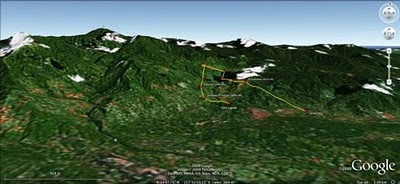 The mission’s actual ‘matching’ of collected GPS data to photographs shows that the Mineral Production Sharing Agreements (MPSA) of two mining firms [MacroAsia and Celestial Nickel Mining and Exploration Corporation (CNMEC) now operated by Ipilan Nickel Corporation (INC)] overlap with precious watersheds endowed with numerous creeks, springs and waterfalls providing potable water to the local indigenous communities and lowland farmers. More importantly, under the ECAN Guidelines of the Strategic Environmental Plan for Palawan (Republic Act 7611), such areas constitute the so called “core zones” of maximum protection where industrial extractive activities are not allowed.
The mission’s actual ‘matching’ of collected GPS data to photographs shows that the Mineral Production Sharing Agreements (MPSA) of two mining firms [MacroAsia and Celestial Nickel Mining and Exploration Corporation (CNMEC) now operated by Ipilan Nickel Corporation (INC)] overlap with precious watersheds endowed with numerous creeks, springs and waterfalls providing potable water to the local indigenous communities and lowland farmers. More importantly, under the ECAN Guidelines of the Strategic Environmental Plan for Palawan (Republic Act 7611), such areas constitute the so called “core zones” of maximum protection where industrial extractive activities are not allowed.
At an altitude of about 500m ASL the mission reached indigenous settlements inhabited by very traditional Palawan having limited contacts with the outside. Their sustenance totally depends on the available forest resources, and it consists of a heterogeneous economy where sustainable swidden cultivation is integrated with foraging and the collection of non-timber forest products (NTFPs).
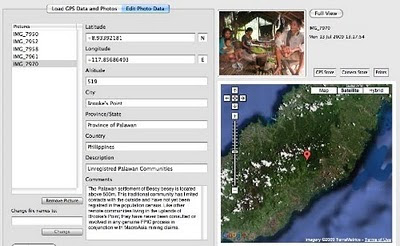
Overall, the mission moved from an elevation of a few meters ASL to an altitude of about 670m ASL, where one of the furthermost Palawan settlements is located. The mission’s GPS coordinates were obtained through the use of the JOBO GPS device being connected to the camera’s hot shoe. Positions were taken at intervals of several meters in order to reconstruct the mission’s full itinerary. The geo-tagged images were then loaded into ‘Photo GPS Editor’ and displayed on satellite Google map. All upland Palawan interviewed during the ALDAW/CBCD mission have declared that they have never been consulted about the entrance of mining companies in their traditional territories.
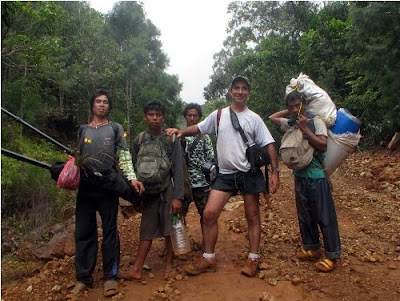
According to indigenous representatives, the Palawan branch of the National Commission on Indigenous Peoples (NCIP) – the government body mandated to ‘protect and promote the interest and well-being of cultural communities’ – is now siding with the mining companies. It is hoped that the ALDAW/CBCD Gantong geo-tagged report will facilitate the circulation of information, at both the national and international levels, on the threats faced by ‘irresponsible mining’ in the Philippines’ “last frontier”. An international campaign to support indigenous Palawan claims to their ancestral land has also been initiated by Survival International.
Source: The ALDAW NETWORK
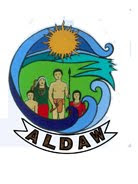
The ALDAW NETWORK (Ancestral Land/Domain Watch) is an advocacy-campaign network of Indigenous Peoples jointly constituted by NATRIPAL (United Tribes of Palawan) and BANGSA PALAWAN PHILIPPINES (Indigenous Alliance for Equity and Wellbeing) on August 2009.
 The mission’s actual ‘matching’ of collected GPS data to photographs shows that the Mineral Production Sharing Agreements (MPSA) of two mining firms [MacroAsia and Celestial Nickel Mining and Exploration Corporation (CNMEC) now operated by Ipilan Nickel Corporation (INC)] overlap with precious watersheds endowed with numerous creeks, springs and waterfalls providing potable water to the local indigenous communities and lowland farmers. More importantly, under the ECAN Guidelines of the Strategic Environmental Plan for Palawan (Republic Act 7611), such areas constitute the so called “core zones” of maximum protection where industrial extractive activities are not allowed.
The mission’s actual ‘matching’ of collected GPS data to photographs shows that the Mineral Production Sharing Agreements (MPSA) of two mining firms [MacroAsia and Celestial Nickel Mining and Exploration Corporation (CNMEC) now operated by Ipilan Nickel Corporation (INC)] overlap with precious watersheds endowed with numerous creeks, springs and waterfalls providing potable water to the local indigenous communities and lowland farmers. More importantly, under the ECAN Guidelines of the Strategic Environmental Plan for Palawan (Republic Act 7611), such areas constitute the so called “core zones” of maximum protection where industrial extractive activities are not allowed.At an altitude of about 500m ASL the mission reached indigenous settlements inhabited by very traditional Palawan having limited contacts with the outside. Their sustenance totally depends on the available forest resources, and it consists of a heterogeneous economy where sustainable swidden cultivation is integrated with foraging and the collection of non-timber forest products (NTFPs).

Overall, the mission moved from an elevation of a few meters ASL to an altitude of about 670m ASL, where one of the furthermost Palawan settlements is located. The mission’s GPS coordinates were obtained through the use of the JOBO GPS device being connected to the camera’s hot shoe. Positions were taken at intervals of several meters in order to reconstruct the mission’s full itinerary. The geo-tagged images were then loaded into ‘Photo GPS Editor’ and displayed on satellite Google map. All upland Palawan interviewed during the ALDAW/CBCD mission have declared that they have never been consulted about the entrance of mining companies in their traditional territories.

According to indigenous representatives, the Palawan branch of the National Commission on Indigenous Peoples (NCIP) – the government body mandated to ‘protect and promote the interest and well-being of cultural communities’ – is now siding with the mining companies. It is hoped that the ALDAW/CBCD Gantong geo-tagged report will facilitate the circulation of information, at both the national and international levels, on the threats faced by ‘irresponsible mining’ in the Philippines’ “last frontier”. An international campaign to support indigenous Palawan claims to their ancestral land has also been initiated by Survival International.
Source: The ALDAW NETWORK

The ALDAW NETWORK (Ancestral Land/Domain Watch) is an advocacy-campaign network of Indigenous Peoples jointly constituted by NATRIPAL (United Tribes of Palawan) and BANGSA PALAWAN PHILIPPINES (Indigenous Alliance for Equity and Wellbeing) on August 2009.
Subscribe to:
Posts (Atom)

